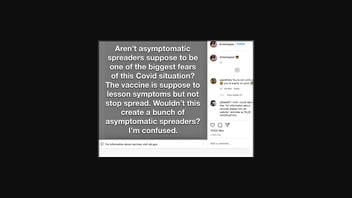
Is the COVID-19 vaccine only supposed to lessen symptoms, but not stop the spread of infection? No, that's not true: The claim is made without evidence nor reference to scientific research and is being spread by a chiropractor. Chiropractors specialize in re-alignment of the skeleton and manipulation of muscles and limbs to relieve pain. Chiropractic curriculum generally does not meet the microbiology, immunology or virology requirements of medical school. Medical doctors with training and clinical experience in infectious disease, microbiology, immunology, virology and vaccinology said the vaccine prevents symptoms, which means it will sharply slow the spread. They point to generations of peer-reviewed research that shows vaccinated patients' immune systems pounce on viruses, killing them off before they can replicate in enough numbers to be sneezed, coughed or spat back out to infect someone else. Testing of COVID-19 vaccines shows they prevent symptoms in the majority of infected patients. And the doctors point to data on the latest testing of the new vaccines that suggests it will behave the same way.
The claim appeared in as a meme in a post (archived here) shared to Instagram on December 15, 2020 by Dr. Ben Tapper. It read:
Aren't asymptomatic spreaders suppose to be one of the biggest fears of this COVID situation? The vaccine is suppose to lesson symptoms but not stop spread. Would this create a bunch of asymptomatic spreaders? I'm confused.
This is what the post looked like at the time of writing:
The meme is at least partially wrong, said Dr. Deborah Fuller, a vaccinologist and professor of microbiology at the University of Washington, and is likely wrong on both counts. In a December 17, 2020 phone interview, Fuller said the COVID-19 vaccine isn't intended to merely reduce symptoms, but to prevent all symptoms. Even in the 5% of infected patients who still had symptoms, they were reduced, which means the vaccine both prevents and symptoms and likely reduces the spread, whether in asymptomatic or symptomatic carriers.
"If you have lower amounts of virus for a shorter period of time, your chances of transmitting it go down," Fuller said. "We don't know yet how much (CCOVID-19) virus has to be in your body to be able to transmit it." She said studies of other vaccines show that patients with their immune systems primed by vaccination are far less likely to infect others."But we can't yet say that goes to absolute zero, and that's why the recommendation is 'Get your vaccine but continue to wear your mask.'"
Fuller said in general, chiropractors are not trained the specialties relevant to judging a COVID-19 vaccine. "In general, the training for a chiropractor isn't in infectious diseases," she said, noting that she avoids drifting out of her specialty into others. "I don't let myself drift because I'm gonna get myself in trouble...there's just too many complex things out there, and I'm sure I'll get it wrong if I if I drift too far out of my zone." At the University of Washington Medical Center, which handled the first widespread outbreak of COVID, Fuller is in charge of a team of scientists working to develop a COVID vaccine.
Dr. Douglas Drevets, Chief of of Infectious Diseases at Oklahoma University Health Sciences Center said the latest information released about safety and effectiveness trials of the Moderna COVID vaccine suggest that in addition to preventing symptoms in infected patients, it seems to reduce the spread of the disease by carriers who are asymptomatic. More data is needed to better understand that effect, but he said the vaccine clearly prevents infection in most people.
In a December 17, 2020 phone call with Lead Stories, Drevets said the reason it reduces spread by even asymptomatic carriers is all down to math:
You know, we're we're going to encounter this organism in the environment. It's gonna happen. And let's just say that you've been vaccinated. This organism comes. It sticks in your nose and it will probably be there for a few days. It may try to replicate. It might try to invade your cells,but because you've been vaccinated, you have an immediate immune response...And so the organism, the virus, never has a chance to replicate to get up to a sufficient number where you can then infect somebody else.
Drevets cautioned against taking infectious disease advice from a chiropractor. "I guess I would say, you know, I don't give advice on how to make people's back feel better, you know, and I I don't think they should be giving advice unless they're trained to about vaccines, public health, infectious diseases, pandemics, that sort of the stuff."
Tapper, of The Wellness Pointe natural health clinic in Omaha, Nebraska, graduated from Palmer College of Chiropractic in Davenport, Iowa. Palmer's three-year curriculum for Doctor of Chiropractic is listed as:
- Chiropractic History and Philosophy
- Taking a Patient's History
- Physical Examination
- Neuromusculoskeletal Examination
- Psychosocial Assessment
- Diagnostic Studies
- Diagnosis/Clinical Impression
- Case Management
- Adjusting the Patient
- Emergency Care
- Case Follow-up and Review
- Record Keeping
- Doctor-Patient Relationship
- Professional Issues
- Public Health and Wellness
- Ethics and Integrity
- Non-adjustive Therapeutic Procedures
- Nutrition
- Patient Education
- Business Management
- Information Literacy

















